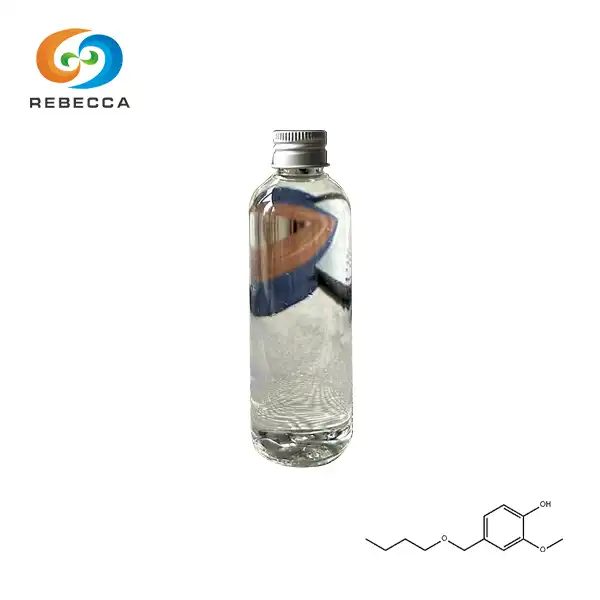Other Name:Tocofersolan,TPGS, Vitamin E-TPGS,Vitamin E Polyethylene Glycol Succinate (TPGS),TPGS-VE.
Active ingredients:D-α-tocopherol
Specification:26%
Appearance: White to yellowish waxy solid
Test Method: HPLC/ChP
Solubility: Soluble in water
Molecular Formula: (C2H4O)nC33H54O5
CAS No.: 9002-96-4
MOQ: 1kg
Sample: 1-5g
Delivery: FedEx, DHL, Ship by air, Ship by sea.
Certifications: ISO, HACCP, KOSHER, HALAL
- Product Description
1.Tocofersolan(TPGS) introduction
Rebecca Bio's Tocofersolan(TPGS) has been approved by FDA as a safe adjuvant and widely used in drug delivery systems. The biological and physicochemical properties of TPGS provide multiple advantages for its applications in drug delivery like high biocompatibility, enhancement of drug solubility, improvement of drug permeation and selective antitumor activity.
Notably, TPGS can inhibit the activity of ATP dependent P-glycoprotein and act as a potent excipient for overcoming multi-drug resistance (MDR) in tumor. In this review, we aim to discuss the recent advances of TPGS in drug delivery including TPGS based prodrugs, nitric oxide donor and polymers, and unmodified TPGS based formulations. These potential applications are focused on enhancing delivery efficiency as well as the therapeutic effect of agents, especially on overcoming MDR of tumors. It also demonstrates that the clinical translation of TPGS based nanomedicines is still faced with many challenges, which requires more detailed study on TPGS properties and based delivery system in the future.
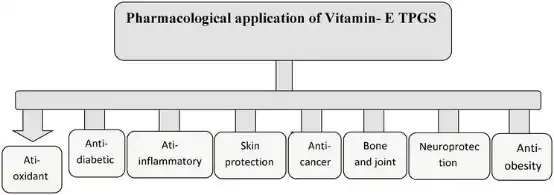
Various pharmacological properties of vitamin E.
1.1 Vitamin E TPGS, an amphiphilic polymer
E TPGS is a water-miscible form of vitamin E, which approved by the FDA and commonly used in drug delivery systems as a safe adjuvant. TPGS’s biological and physicochemical properties provide several advantages for its drug delivery applications such as high biocompatibility, drug solubility enhancement, drug permeation improvement, and selective antitumor activity .
1.2 Structure and properties
Vitamin E Tocofersolan(d-alpha-tocopheryl polyethylene glycol 1000 succinate or TPGS) is a water-soluble derivative of natural vitamin E, formed together with polyethylene glycol 1000 by esterification of d-alpha-tocopheryl polyethylene glycol succinate. Furthermore, TPGS is a macromolecule consisting of a lipophilic alkyl tail and a hydrophilic polar head which has amphiphilic properties (see Figure 2).

Figure 2.
Chemical structure of Vitamin E Tocofersolan. The lipophile to hydrophile equilibrium of the TPGS is an unique amphiphilic structure. Consequently, it is a waxy solid with an air-stable melting point of about 41° C, ranging from yellow to light brown in color. In nature, it is bulky and has a broader surface area, so it is considered the ideal emulsifier and strong solubilizer . The chemical structure of TPGS used in many formulations/applications shown in Figure 2, such as: 1. Improving drug bioavailability, 2. Properties of surfactants which improve the solubilization of drugs poorly water soluble, 3. Stabilizer of amorphous drug forms 4. Inhibiting the efflux of P-glycoprotein which improves drug permeability, 5. Emulsion vehicle, 6. The active ingredient in self-emulsifying formulations, 7. Minimize drug damage to dermal tissues, 8. Carrier for wound care and therapy, 9. Vitamin E water-soluble source, 10. Fabrication nanosuspensions, 11. Self-microemulsifying and solid tablet/dispersion 12. Vaccine device Adjuvant, 13. Boost of nutrition, 14. Nano-particles formulation, 15. Micelles, 16. Liposomes, 17. Based prodrug.
TPGS-VE is an active solubilizer of various compounds that are water-soluble and insoluble in water, such as steroids, antibiotics, cyclosporins, taxanes, etc. TPGS vitamin E could function as a P-gp inhibitor with a higher capacity than other non-ionic surfactants, such as Tween 80, Pluronics and Cremophor EL, to inhibit P-gp activity .
2. Absorption/bioavailability enhancer
Several studies indicated that the increased bioavailability was due to micelle formation improving solubility, while others showed that P-glycoprotein (P-gp) inhibition contributes to increased permeability support.
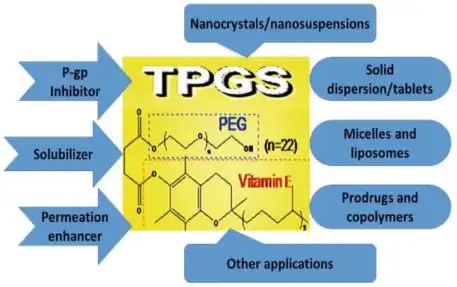
Figure 3.
The applications of vitamin E TPGS in drug delivery .Polyethyeleneglycol (PEG).
2.1 TPGS properties in drug delivery systems
The water-miscible type of vitamin E, TPGS, consists of a hydrophilic chain of PEG connected to the hydrophobic portion of vitamin E. According to a particular amphiphilic structure, it shows wonderful drug delivery capability.
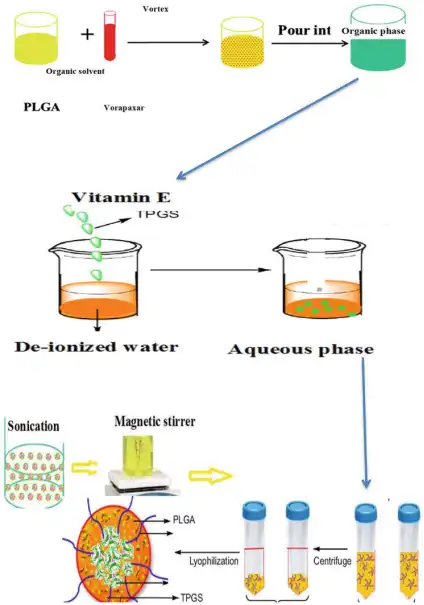
3. TPGS as a surfactant
Poor water solubility and/or poor permeability remain the great snag for maximum activity of therapeutic drugs. In drug delivery, TPGS can be used as a solubilizer, permeation enhancer, diffusion, and emulsifier as well as as a surface stabilizer. It has been commonly used for many poorly water-soluble or permeable drugs in the manufacture of nanodrugs or other formulations, mainly for class II and IV Biopharmaceutical Classification System (BCS) drugs .
4. Role of TPGS to control cancer cell
4.1 α-Ractive oxygen species stimulation
4.2 DNA damage
4.3 TPGS based prodrugs
5. Effect of TPGS on malaria
Tocofersolan(TPGS) is a suitable candidate for safe new anti-malarial drug, This research has shown that TPGS therapy of malaria, survival rates in mice infected with two parasites have been significantly elevated. Similarly, the severity of Evans blue staining on the brains taken from mice treated with TPGS was lower than the remedy not received by mice.
6. TPGS based polymers in drug delivery
TPGS-based polymers are extensively used in the drug delivery system, which can enhance the drug’s encapsulation efficiency, intracellular cell uptake and therapeutic efficacy in vitro and in vivo
TPGS based formulations to improve drug oral bioavailability
7. Osteoartharitis
Osteoarthritis (OA) of the knee is a major reason of chronic, incompetence in elderly people, the pathogenesis of this disease until now not clear understood. Recent guide demonstrates that oxidative stress, the event wherein oxidant levels overtake those of antioxidative agents, is one of the motives factors of OA. ROS including oxidants that are generated under the physiological situation in the human body and controlled by cellular antioxidants, lead to functional and structural damage of cartilage cells.
Packing
For powder products, we usually send the products together with cartons or fiber drums.Our packaging methods are 1 kg/aluminum bag, 25 kg/box, and 25 kg/barrel. For some products that require special packaging during transportation, we will carry out more detailed packaging.
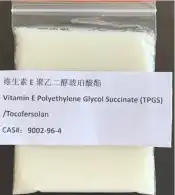
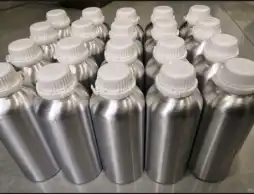
Transportation
We support shipping by air, sea, FedEx, DHL, TNT, EMS, UPS, SF, and other carrier.

Our laboratory and Factory
As a professional Tocofersolan(TPGS) supplier, our quality inspection department is equipped with the most advanced testing and identification instruments, such as UPLC, HPLC, UV and TT (active ingredients) GC and GC-MS (solvent residue), ICP-MS ( Heavy metals), GC/LC-MS-MS (pesticide residues), HPTLC and IR (identification), ELIASA (ORAC value), PPSL (irradiation residues), microbial detection, etc.

Contact us
To view our brochure or discuss a bulk order Tocofersolan(TPGS), contact us at information@sxrebecca.com.
_1730691017423.webp)

_1735529080429.webp)









